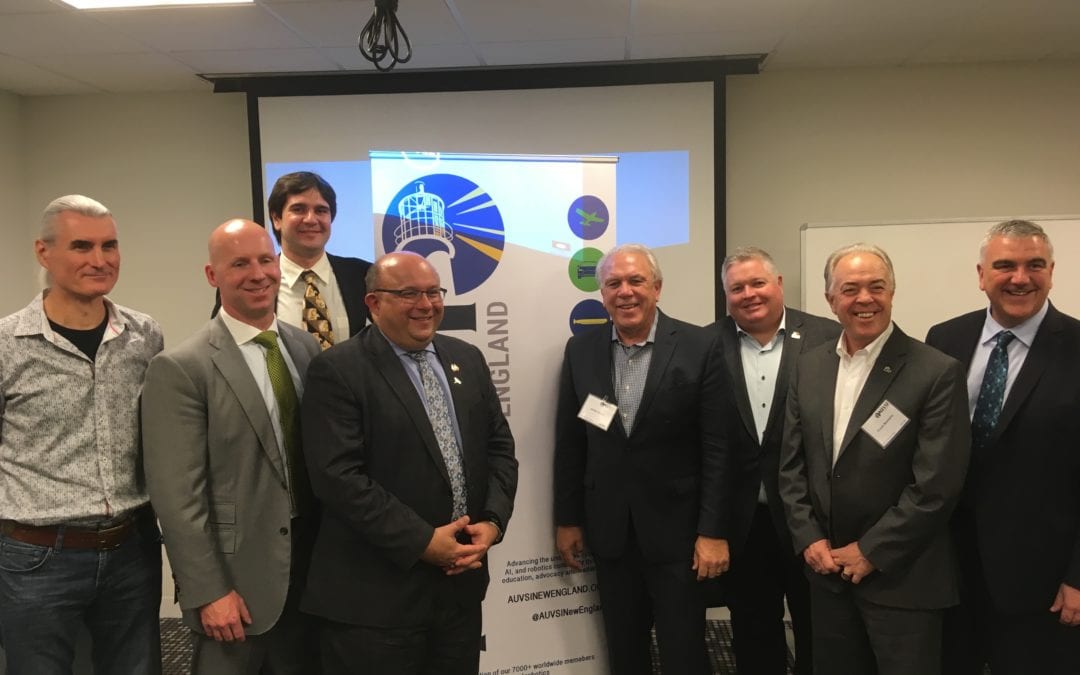
AUVSI Forum on Cybersecurity in Autonomous Vehicles Showcases Boston and Waterloo Innovation
Jim Sproul of The Sproul Company recently moderated an AUVSI New England panel titled “Unmanned Systems: Security Without Compromise.” Presented in cooperation with the office of the Consulate General of Canada in Boston, the event featured cybersecurity thought leaders from Booz Allen and the Commonwealth of Massachusetts, as well as Waterloo-based technology companies Blackberry and ISARA, all of whom shared expertise in the fields of connected and automated vehicles (CAV) and cybersecurity. Also in attendance, the Canadian Technology Accelerator in Boston, which provides a platform for Canadian companies to access Boston-area technology partnerships, funding, and markets.
Four distinguished speakers appeared in the panel. Each provided a unique perspective on security in the CAV market:
Alex Manea, Chief Security Officer, BlackBerry
Most of us think of BlackBerry as a smartphone company, but they have evolved to become a software and security company. With over 50% share in the automotive market, BlackBerry’s QNX operating system offers a broad portfolio of software solutions for connected cars. Automobiles are mobile IT networks and hackers can steal data or take over the controls. In 2015, security experts hacked a Jeep Cherokee, eventually cutting the transmission. Manea spoke of the need to keep vehicles of the future safe by updating security models starting with hardware roots of trust and security built-in at the application level.
Hans Olson, Assistant Undersecretary for Homeland Security, Commonwealth of Massachusetts
The Commonwealth of Massachusetts has encouraged automated vehicle testing within the state and is now hosting three companies actively testing CAVs. The Homeland Security Division works with other local, state and federal agencies to protect the commonwealth’s 16 critical infrastructures. Olson encouraged CAV companies to think about cyber security as they bring vehicles to market.
Paul Lucier, VP Sales and Business Development, ISARA
Experts estimate that quantum computers will break today’s ubiquitous public key cryptography in 7-15 years. This would affect VPNs, public key encryption, IoT devices, blockchain, and more. With cars averaging 11 years in service, some of the vehicles that are being sold today could be on the road in the post-quantum era. Waterloo-based ISARA is a security solutions company that offers quantum computer-resistant security products that address this challenge.
Chris Poulin Principal, Director, IoT Security & Cyber Futures, Booz Allen Hamilton
Booz Allen maintains an engineering team that investigates vulnerabilities in embedded systems. One of their projects is to explore the attack surfaces on CAVs: keyless entry, blue tooth, WiFI, media players, telematics and more. Modern luxury vehicles typically use over 100 million software lines of code, which on average could contain thousands of latent vulnerabilities.
Boston-Waterloo Cyber Innovation
As technology and innovation hubs, Boston- and Waterloo-based companies are studying and addressing security and data safety challenges related to autonomous vehicles and unmanned systems. The next generation of connected autonomous vehicles will face component failures and intentional malicious activities. Innovative companies and public-sector initiatives will play a role in deftly managing these threats.

Recent Comments